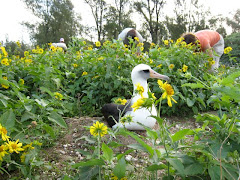Welcome to the PAA Blog
Papahānaumokuākea 'Ahahui Alaka'i (PAA) is a ten-day experiential leadership program that brings together teachers, business people, policy-makers as well as potential community leaders interested in learning and being inspired by science and traditional knowledge management practices. Papahānaumokuākea Marine National Monument encompasses roughly 140,000 square miles of the Pacific Ocean, an area larger than all the country's national parks combined. The area around the Northwestern Hawaiian Islands is an important safe haven for wildlife such as the threatened green turtle and the endangered Hawaiian monk seal. ‘Ahahu‘i refers to society, club or association. Alaka’i is Hawaiian for ambassador or leader. The Hawaiian word /acronym PA‘A means steadfast, learned, determined, strong, to hold, keep, retain.
Monday, June 8, 2009
Introductions: Meghan Marrero
I cannot even begin to describe how eagerly I am anticipating this experience! It’s hard to pinpoint exactly what I hope to gain because I feel like there is just so much to be soaked up. I am excited about so many different aspects of this trip.
I have always been interested in marine biology, so I am really interested in talking with the scientists about their work and then thinking about the educational aspects of what they are doing. In particular, through the NOAA-sponsored ACES program, we have done a lot of work with marine animal tracking, including albatrosses and sea turtles. I have never seen an albatross before, so that will certainly make me feel more in touch with the animals whose paths I have been watching as they crisscross the Pacific. We have done curriculum modules about marine debris and the Pacific Garbage Patches, so I anticipate being able to add to those discussions after my own experiences and talking to the scientists.
Another aspect about which I’ve become extremely curious is the Native Hawaiian cultural ties to the islands and to the ocean. In our Climate Change program, we have worked closely with Alaska Natives and I am so intrigued about indigenous traditional knowledge, and how to bring that into education for scientific literacy. I believe that bringing in this rich knowledge and history will only help students to better understand and be engaged in science. I think that working with folks who have a strong background in this area will help me, a white lady from New York, to better solidify how this can be done—I have many ideas flying around in my head but I’m not quite sure yet how to tie them all together.
My plan for my main project is to incorporate what I have learned into a professional development course that I teach called Lessons from the Ocean. In this course, we discuss how to use the ocean as an engaging context for standards-based science topics. I anticipate being able to use some of what I gather for biological topics, i.e., ecosystems, human impacts, genetics, as well as physical topics, i.e., atoll formation, plate tectonics & hot spots, etc.
I have always been interested in marine biology, so I am really interested in talking with the scientists about their work and then thinking about the educational aspects of what they are doing. In particular, through the NOAA-sponsored ACES program, we have done a lot of work with marine animal tracking, including albatrosses and sea turtles. I have never seen an albatross before, so that will certainly make me feel more in touch with the animals whose paths I have been watching as they crisscross the Pacific. We have done curriculum modules about marine debris and the Pacific Garbage Patches, so I anticipate being able to add to those discussions after my own experiences and talking to the scientists.
Another aspect about which I’ve become extremely curious is the Native Hawaiian cultural ties to the islands and to the ocean. In our Climate Change program, we have worked closely with Alaska Natives and I am so intrigued about indigenous traditional knowledge, and how to bring that into education for scientific literacy. I believe that bringing in this rich knowledge and history will only help students to better understand and be engaged in science. I think that working with folks who have a strong background in this area will help me, a white lady from New York, to better solidify how this can be done—I have many ideas flying around in my head but I’m not quite sure yet how to tie them all together.
My plan for my main project is to incorporate what I have learned into a professional development course that I teach called Lessons from the Ocean. In this course, we discuss how to use the ocean as an engaging context for standards-based science topics. I anticipate being able to use some of what I gather for biological topics, i.e., ecosystems, human impacts, genetics, as well as physical topics, i.e., atoll formation, plate tectonics & hot spots, etc.
Subscribe to:
Post Comments (Atom)

















No comments:
Post a Comment